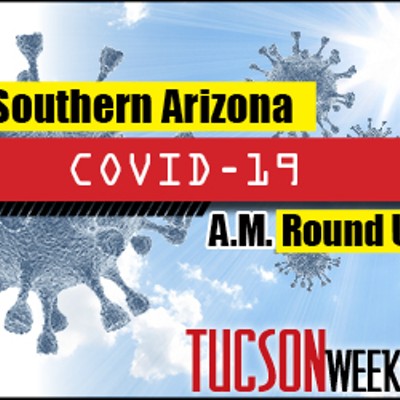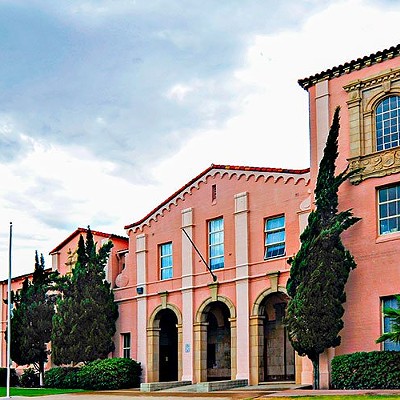Friday, November 23, 2012
Was TUSD's Special Meeting Legal?
Tuesday afternoon, Sylvia Campoy warned the Tucson Unified School District board members by e-mail that their special meeting that evening at Catalina Magnet High School to decide what schools to consider for closure and consolidation was in "clear violation of Arizona Open Meeting Law as well a violation of TUSD policies."
Campoy is concerned because the materials the board members needed to help them make a decision were not in the board packet made available for public review — 24 hours before the board meeting.
"It would seem impossible at this point NOT to utilize the materials you received last evening in your study/review and decision-making of the issue. It would be somewhat like attempting to squeeze the toothpaste back into the tube- simply impossible," Campoy wrote.
"The Board agenda packet, both by title and practice is, in fact, a functional part of the Board agenda; it contains specific information about each matter/agenda item, exclusive of executive session agenda items. The agenda Board packet is made available to the public the day before the Board meeting; usually in the afternoon for the purpose of notifying the public twenty-four hours prior to the Board Meeting. This allows members of the public to review the Board agenda packet and learn the specifics about the agenda items which are listed on the Board agenda. Based on the specifics found on each matter, members of the public are availed the opportunity to make inquiry and/or express their opinion about any listed Board agenda item(s) prior to any discussion, consideration or action taken by the Board."
This isn't the first time Campoy, a former TUSD teacher, former TUSD governing board member and former director of the city of Tucson's Equal Opportunity Program, has warned the governing board of previous meeting violations.
This summer on June 2, 2012, Campoy also let state Attorney General Tom Horne know about past alleged violations in an investigation request, but because it is, well, Horne, she also asked the state’s top attorney to recuse his office from the investigation.
One of the two meetings brought up in the complaint pertains to the Jan. 10, 2012 Mexican-American studies action, and Campoy brought up the obvious conflict — that Horne is the state’s anti-Mexican-American studies law champion and creator.
“Your strong position pertaining to the TUSD Mexican American Studies Department and courses is renowned both at the state and national level,” Campoy wrote to Horne.
“In order to ensure that there is a thorough and impartial investigation conducted into the allegations I have outlined, I respectfully request that your office recuse itself from conducting the investigation and that my complaint be immediately forwarded to the Pima County Attorney for investigation.”
At the Jan. 10 board meeting, board member Michael Hicks read the a resolution out loud that led to the dismantling of the Mexican-American studies classes, as well as the steps taken to take out all MAS-literature and textbooks. The board voted 4-1 that night, with Adelita Grijalva voting no.
Campoy’s complaint contends that the resolution was not properly entered into the board materials or agenda items as an item the board would be taking a vote on. In her complaint, she wrote that the board agenda packet, in which the public is entitled to a copy of all materials, provided to the board for a copying fee, is usually made public the day before the board meeting.
However, the agenda and packet for the Jan. 10 meeting, according to Campoy “did not contain information relative to the listed agenda items under question. Due to the lack of specifics in these agenda items as well as the absence of the information within the coinciding agenda packets, it is clear that there was failure to notify the public about Board agenda items in accordance (with Arizona law).”
In other words, what’s now called the Hicks’ resolution was not listed on the agenda that evening or included in the agenda packet that she received a copy of. What was on the agenda item was listed under study/action: “Superintendent of Public Instruction John Huppenthal’s Final Ruling Regarding Tucson Unified School District’s Mexican American Studies Program — Consider Alternatives and Direct Attorneys Representing Tucson Unified School District and the Superintendent.”
It wasn’t until the meeting was in session that the public was fully aware that an action was going to take place and that resolution was presented to the public for the first time — read aloud by Hicks as a motion for approval and then voted on by the board. Campoy wrote in her complaint that open meeting law dictates that the resolution should have been in the board agenda.
There were rumors that a vote would take place that evening and the board room was packed with MAS supporters who spoke during call to audience about protecting the classes. Campoy mentioned in her complaint that she also spoke during call to audience to remind the board they were still under a federal desegregation order that called for the expansion of the district’s MAS classes, not cutting them.
But no one in the room knew about the resolution or spoke regarding the resolution — just the study item. The resolution came last. From Campoy’s experience and current representative of the Mendoza plaintiff’s in TUSD deseg case, she said it should have been listed as a resolution on the agenda and part of public discussion.
When we met with Campoy to look over the complaint, she said she kept in contact with the AG’s office, but didn’t receive a formal response until Aug. 22. Campoy was right — the AG can’t investigate, but told her the office has no authority to refer to another investigating body, such as the Pima County Attorney’s office.
“Because of a conflict of interest, the Office of the Attorney General cannot investigate the allegations set forth in the complaint,” the AG’s Arizona Solicitor General David R. Cole wrote to Campoy.
“Furthermore, the law does not give this Office authority to simply refer your complaint to another agency. You should consider filing your complaint with the Office of the Pima County Attorney.”
On Oct. 10, Campoy did just that, writing a letter to Pima County Attorney Barbara LaWall, asking that her office investigate the allegations, attaching her 8-page complaint to the AG’s office along with seven exhibits.
The Tucson Weekly, contacted the AG’s office for comment, but never heard back. We also contacted the Pima County Attorney’s office. Pima County Attorney’s Chief Civil Deputy Christopher Straub told us that his office is looking the complaint, but at the time the office was busy with elections complaints. The Range will follow-up this week,and also post a copy of Campoy's complaint, and a post-holiday response from TUSD legal regarding the allegations.
When we first read Campoy's complaint in October, asked governing board member Mark Stegeman his thoughts about the complaint and allegations. This was his response by e-mail:
Concerning the May item, it is common for the Board to adopt resolutions or other actions that have not been explicitly posted before the meeting. Indeed, if it was known in advance exactly what the Board would adopt, then that circumstance would in itself suggest a violation of OML. Any regular observer of the TUSD Board (or other similar bodies) knows that many items originally proposed are amended or modified before passage; many agenda items are posted with little information attached, the specifics being revealed at the meeting.So I don't think that item presents any OML issue.
For the January item, the questions are whether the Board's resolution was properly read into the record and whether it was reasonably encompassed by the title of the agenda item. If the district's legal counsel felt that there was a legal issue, then she presumably would have so advised us. I acknowledge that the issue concerning the agenda title could at least be reasonably debated, but I am not an attorney and thus not the proper person to engage that debate.
Nonetheless, from a practical rather than a legal viewpoint I think everyone understood that a resolution similar to the one adopted was one of the Board's possible responses to the ADE's action. The apparent intent of the law is to prevent public bodies from making decisions in secret, when people are not looking, and that hardly seems to have been the situation in January.
Campoy said she also has concerns about the May 8 board meeting when 8th grade promotion listed on the agenda, but there was no information in the board packet. Campoy e-mailed then-board president Stegeman, who brought the resolution forward as a study item.
“I reminded him that a similar situation had occurred with Mexican American Studies. … In either case, the Board agenda packet did not contact the specifics on the matter,” Campoy wrote in her complaint.
Stegeman’s response was “It is on the agenda only for study; it is not going forward for action. I agree that action would not be appropriate.”
“His explanation shows disregard for the State Open Meeting Law requirement which mandates that agendas shall list the specific matter to be discussed, considered or decided at the meeting,” Campoy wrote.
Here is a Campoy's latest e-mail to the board on Tuesday's meeting:
Urgent- Open Meeting Law Requirements- Governing Board Meeting of November 20, 2012 Inbox
Sylvia Campoy
12:25 PM (29 minutes ago)
to Adelita, Miguel, MICHAEL, Alexandre, markstegeman, John, MaryAlice TUSD Governing Board President Dr. Mark Stegeman Clerk of the Board Mr. Michael Hicks Governing Board Members- Dr. Alex Sugiyama, Ms.Adelita Grijalva and Mr. Miguel Cuevas
Re: Open Meeting Law- 24 Hour Notice to the Public
From what I have been able to ascertain pertaining to tonight's Governing Board Meeting agenda, Board Agenda packet materials relative to school consolidation/closures were provided to Board members yesterday evening (after 6:00 PM). These materials appear to contain vital information relative to the Governing Board study/action under the agenda items listed below* for the Governing Board Meeting of November 20, 2012. Given the time that the materials were made available to you, they were most certainly NOT contained within the Board Agenda packet- which is made available to members of the public for review- twenty-four hours prior to the Board meeting. I believe this to be a clear violation of Arizona Open Meeting Law as well a violation of TUSD policies.
It would seem impossible at this point NOT to utilize the materials you received last evening in your study/review and decision-making of the issue. It would be somewhat like attempting to squeeze the toothpaste back into the tube- simply impossible. What you have learned from the information which was provided to you has likely had some impact on your decision-making. For the reasons given above, it is clear that you must remedy this matter by giving ample notice to the public and rescheduling the meeting in accordance with state mandate and TUSD policy. Some of you have been adamant about adhering to state law in regard to other matters; I am hopeful that your devotion to such adherence will be displayed in your swift action to correct this matter, which will also show respect for the rights provided for members of the public under open meeting law requirements.
The Board agenda packet, both by title and practice is, in fact, a functional part of the Board agenda; it contains specific information about each matter/agenda item, exclusive of executive session agenda items. The agenda Board packet is made available to the public the day before the Board meeting; usually in the afternoon for the purpose of notifying the public twenty-four hours prior to the Board Meeting. This allows members of the public to review the Board agenda packet and learn the specifics about the agenda items which are listed on the Board agenda. Based on the specifics found on each matter, members of the public are availed the opportunity to make inquiry and/or express their opinion about any listed Board agenda item(s) prior to any discussion, consideration or action taken by the Board.
As you are aware, this is not the first time I have brought such concerns to your attention. It appears that under the current Governing Board Agenda committee there has been and there continues to be grave disregard for following the twenty-four hour requirement to notify the public as mandated by the state as well as TUSD policy and historically established practices. Arizona State Statute ARTICLE 3.1 - PUBLIC MEETINGS AND PROCEEDINGS in part states:
38-431.02. Notice of meetings
G. Notice required under this section shall include an agenda of the matters to be discussed or decided at the meeting or information on how the public may obtain a copy of such an agenda. The agenda must be available to the public at least twenty-four hours before the meeting, except in the case of an actual emergency under subsection D of this section. The twenty-four hour period includes Saturdays if the public has access to the physical posted location in addition to any website posting, but excludes Sundays and other holidays prescribed in section 1-301.
Thank you for your immediate attention to this matter.
Respectfully,
Sylvia Campoy
Tags: TUSD , Tucson Unified School Distrct , Mark Stegeman , Michael Hicks , Adelita Grijalva , Alexandre Sugiyama , Miguel Cuevas , John Pedicone , Sylvia Campoy , Tom Horne , Mexican-American studies , MAS , special meeting , school closures , consolidations , open meetings law violations , Pima County Attorney , Barbara LaWall , Chris Straub














